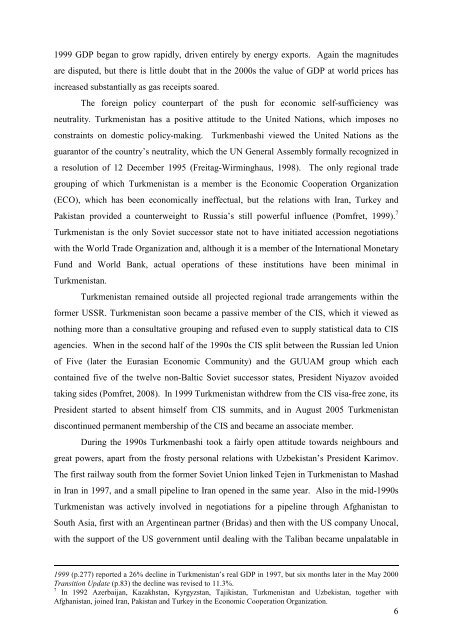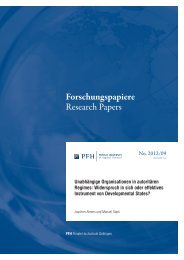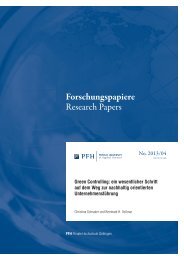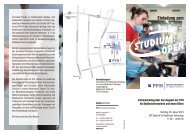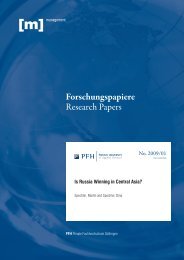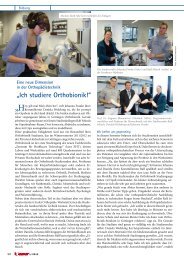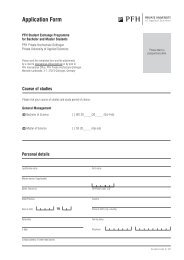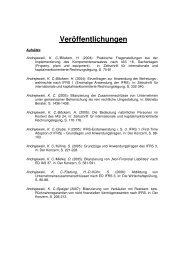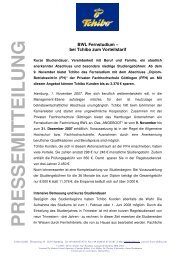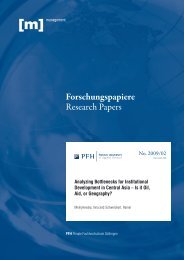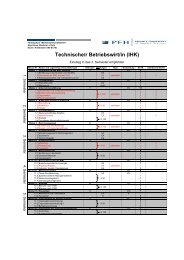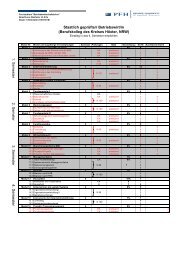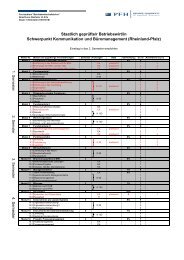Forschungspapiere Research Papers - PFH Private Hochschule ...
Forschungspapiere Research Papers - PFH Private Hochschule ...
Forschungspapiere Research Papers - PFH Private Hochschule ...
You also want an ePaper? Increase the reach of your titles
YUMPU automatically turns print PDFs into web optimized ePapers that Google loves.
1999 GDP began to grow rapidly, driven entirely by energy exports. Again the magnitudes<br />
are disputed, but there is little doubt that in the 2000s the value of GDP at world prices has<br />
increased substantially as gas receipts soared.<br />
The foreign policy counterpart of the push for economic self-sufficiency was<br />
neutrality. Turkmenistan has a positive attitude to the United Nations, which imposes no<br />
constraints on domestic policy-making. Turkmenbashi viewed the United Nations as the<br />
guarantor of the country’s neutrality, which the UN General Assembly formally recognized in<br />
a resolution of 12 December 1995 (Freitag-Wirminghaus, 1998). The only regional trade<br />
grouping of which Turkmenistan is a member is the Economic Cooperation Organization<br />
(ECO), which has been economically ineffectual, but the relations with Iran, Turkey and<br />
Pakistan provided a counterweight to Russia’s still powerful influence (Pomfret, 1999). 7<br />
Turkmenistan is the only Soviet successor state not to have initiated accession negotiations<br />
with the World Trade Organization and, although it is a member of the International Monetary<br />
Fund and World Bank, actual operations of these institutions have been minimal in<br />
Turkmenistan.<br />
Turkmenistan remained outside all projected regional trade arrangements within the<br />
former USSR. Turkmenistan soon became a passive member of the CIS, which it viewed as<br />
nothing more than a consultative grouping and refused even to supply statistical data to CIS<br />
agencies. When in the second half of the 1990s the CIS split between the Russian led Union<br />
of Five (later the Eurasian Economic Community) and the GUUAM group which each<br />
contained five of the twelve non-Baltic Soviet successor states, President Niyazov avoided<br />
taking sides (Pomfret, 2008). In 1999 Turkmenistan withdrew from the CIS visa-free zone, its<br />
President started to absent himself from CIS summits, and in August 2005 Turkmenistan<br />
discontinued permanent membership of the CIS and became an associate member.<br />
During the 1990s Turkmenbashi took a fairly open attitude towards neighbours and<br />
great powers, apart from the frosty personal relations with Uzbekistan’s President Karimov.<br />
The first railway south from the former Soviet Union linked Tejen in Turkmenistan to Mashad<br />
in Iran in 1997, and a small pipeline to Iran opened in the same year. Also in the mid-1990s<br />
Turkmenistan was actively involved in negotiations for a pipeline through Afghanistan to<br />
South Asia, first with an Argentinean partner (Bridas) and then with the US company Unocal,<br />
with the support of the US government until dealing with the Taliban became unpalatable in<br />
1999 (p.277) reported a 26% decline in Turkmenistan’s real GDP in 1997, but six months later in the May 2000<br />
Transition Update (p.83) the decline was revised to 11.3%.<br />
7 In 1992 Azerbaijan, Kazakhstan, Kyrgyzstan, Tajikistan, Turkmenistan and Uzbekistan, together with<br />
Afghanistan, joined Iran, Pakistan and Turkey in the Economic Cooperation Organization.<br />
6


